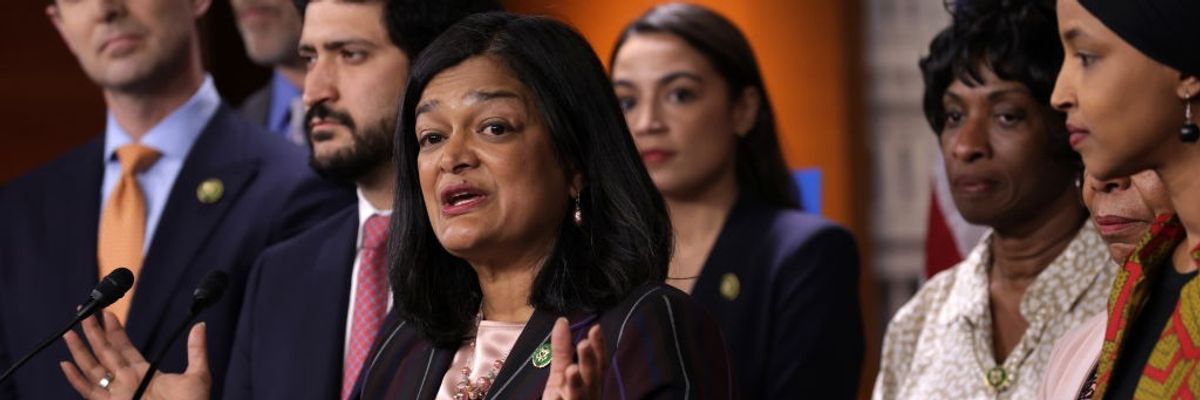The Congressional Progressive Caucus on Thursday published a "comprehensive domestic policy legislative agenda" for U.S. President Joe Biden's possible second White House term that seeks to "deliver equality, justice, and economic security for working people."
The CPC's
Progressive Proposition Agenda is a seven-point plan aimed at lowering the cost of living, boosting wages and worker power, advancing justice, combating climate change and protecting the environment, strengthening democracy, breaking the corporate stranglehold on the economy, and bolstering public education.
"Progressives are proud to have been part of the most significant Democratic legislative accomplishments of this century. We have made real progress for everyday Americans—but there's much more work to be done," Congressional Progressive Caucus Chair Pramila Jayapal (D-Wash.) said in a statement.
"That's why the Progressive Caucus has identified these popular, populist, and possible solutions," she added. "Democrats in Congress can meet the urgent needs people are facing; rewrite the rules to ensure majorities of this country are no longer barred from the American promise of equality, justice, and economic opportunity; and motivate people with a vision of progressive governance under Democratic majorities in the House and Senate and a Democratic White House."
Progressive lawmakers have already introduced bills for many items on the agenda, including a Green New Deal for Public Schools, expanding the Supreme Court, comprehensive voting rights protection, and legalizing marijuana.
Critics noted the conspicuous absence of Medicare for All—once a top progressive agenda item—and foreign policy issues including ending Israel's genocide, apartheid, occupation, settler colonization, and ethnic cleansing in Palestine.
Jayapal toldNBC News that the CPC is focusing its blueprint exclusively on domestic goals—especially ones it feels can be achieved.
"The way we came to this agenda is to say that we were going to put into this agenda things that were populist and possible... and affected a huge number of people," she said. "We haven't taken a position on particularly Israel and Gaza in the progressive caucus, and so that's not on here."
The CPC agenda is backed by a wide range of labor, climate, environmental, civil rights, consumer, faith-based, and other organizations.
"The Congressional Progressive Caucus is leading the way for Congress to address the major issues affecting working families, from reducing healthcare and housing costs to strengthening workers' rights to join unions, earn living wages and benefits, and have safe workplaces," Service Employees International Union president Mary Kay Henry said in a statement.
"SEIU is proud to partner with the CPC to move these priorities forward and build a more equitable economy in which corporations are held accountable for their actions," she added.
Mary Small, chief strategy officer at Indivisible, said: "House progressives were the engine at the heart of our legislative accomplishments in 2021 and 2022. They've continued that momentum to be true governing partners to the Biden administration as those laws and programs are implemented."
"That's why Indivisible is so supportive of the CPC's
Proposition Agenda, a bold vision for progressive governance in 2025 and beyond. From reproductive rights to saving our democracy to economic security for all, the CPC is driving forward exactly the sort of legislative goals we want to see in our next governing moment."
That moment is far from guaranteed, with not only the White House hanging in the balance as Biden will all but certainly face former Republican President Donald Trump in November's election but also the Senate Democratic Caucus clinging to a single-seat advantage over the GOP. Republicans currently hold the House of Representatives by a five-seat margin.
